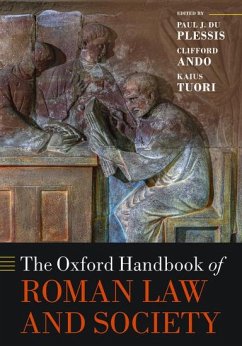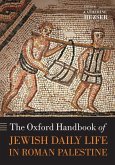The Oxford Handbook of Roman Law and Society
Herausgeber: Du Plessis, Paul J; Tuori, Kaius; Ando, Clifford
The Oxford Handbook of Roman Law and Society
Herausgeber: Du Plessis, Paul J; Tuori, Kaius; Ando, Clifford
- Broschiertes Buch
- Merkliste
- Auf die Merkliste
- Bewerten Bewerten
- Teilen
- Produkt teilen
- Produkterinnerung
- Produkterinnerung
The Oxford Handbook of Roman Law and Society offers a reassessment of Roman law of the long classical period in light of Roman society.
Andere Kunden interessierten sich auch für
![The Oxford Handbook of Jewish Daily Life in Roman Palestine The Oxford Handbook of Jewish Daily Life in Roman Palestine]() The Oxford Handbook of Jewish Daily Life in Roman Palestine62,99 €
The Oxford Handbook of Jewish Daily Life in Roman Palestine62,99 €![The Oxford Handbook of Roman Britain The Oxford Handbook of Roman Britain]() The Oxford Handbook of Roman Britain63,99 €
The Oxford Handbook of Roman Britain63,99 €![The Oxford Handbook of Irish English The Oxford Handbook of Irish English]() The Oxford Handbook of Irish English208,99 €
The Oxford Handbook of Irish English208,99 €![The Oxford Handbook of the Sources of International Law The Oxford Handbook of the Sources of International Law]() The Oxford Handbook of the Sources of International Law317,99 €
The Oxford Handbook of the Sources of International Law317,99 €![The Oxford Handbook of European Legal History The Oxford Handbook of European Legal History]() The Oxford Handbook of European Legal History273,99 €
The Oxford Handbook of European Legal History273,99 €![The Oxford Handbook of International Law in Armed Conflict The Oxford Handbook of International Law in Armed Conflict]() The Oxford Handbook of International Law in Armed Conflict82,99 €
The Oxford Handbook of International Law in Armed Conflict82,99 €![The Oxford Handbook of the History of International Law The Oxford Handbook of the History of International Law]() The Oxford Handbook of the History of International Law120,99 €
The Oxford Handbook of the History of International Law120,99 €-
-
-
The Oxford Handbook of Roman Law and Society offers a reassessment of Roman law of the long classical period in light of Roman society.
Hinweis: Dieser Artikel kann nur an eine deutsche Lieferadresse ausgeliefert werden.
Hinweis: Dieser Artikel kann nur an eine deutsche Lieferadresse ausgeliefert werden.
Produktdetails
- Produktdetails
- Oxford Handbooks
- Verlag: Oxford University Press
- Seitenzahl: 752
- Erscheinungstermin: 13. März 2020
- Englisch
- Abmessung: 242mm x 167mm x 40mm
- Gewicht: 1296g
- ISBN-13: 9780198852896
- ISBN-10: 0198852894
- Artikelnr.: 58342307
- Herstellerkennzeichnung
- Libri GmbH
- Europaallee 1
- 36244 Bad Hersfeld
- gpsr@libri.de
- Oxford Handbooks
- Verlag: Oxford University Press
- Seitenzahl: 752
- Erscheinungstermin: 13. März 2020
- Englisch
- Abmessung: 242mm x 167mm x 40mm
- Gewicht: 1296g
- ISBN-13: 9780198852896
- ISBN-10: 0198852894
- Artikelnr.: 58342307
- Herstellerkennzeichnung
- Libri GmbH
- Europaallee 1
- 36244 Bad Hersfeld
- gpsr@libri.de
Paul du Plessis is a legal historian whose research interests include Roman law, medieval interpretations of Roman law, Roman-Dutch law, the historical development of the civilian tradition in mixed jurisdictions, the relationship between law and history as well as between law and society in a historical context. He is a member of various organizations dedicated to the study of legal history, sometime webmaster of the Centre for Legal History at Edinburgh University and convener of the Edinburgh Roman Law Group. He is co-author of the Edinburgh Legal History Blog. He is the general editor (with Thomas McGinn) of the monograph series Oxford Studies in Roman Society and Law. Clifford Ando is an historian of government, law, and religion specializing in the ancient Mediterranean between the late Hellenistic and late Roman periods. He has particular interests in contemporary social and political theory, public law, practices of legal interpretation, and metaphor and cognition. Kaius Tuori is currently Associate Professor of European Intellectual History at the University of Helsinki. His research interests include legal history, Roman law, legal anthropology, classical archaeology, and their intellectual history. In addition to four books, his work has been published in Law, Culture and the Humanities, The Journal of Legal History, the Journal of Legal Pluralism, Revue internationale des droits de l'Antiquite and the Legal History Review. He holds a doctorate in Law and an MA in History from his studies at the universities of Helsinki, Finland, and La Sapienza in Rome, Italy.
* Part I: Introduction
* 1: Paul J. du Plessis, Clifford Ando and Kaius Tuori: A Word from the
Editors
* 2: Janne Pölönen: Framing "Law and Society" in the Roman World
* Part II: Reading Roman Law
* 3: Dario Mantovani: More than Codes: Roman Ways of Organising and
Giving Access to Legal Information
* 4: Tommaso Beggio: Epigraphy
* 5: José Luis Alonso Rodríguez: Juristic Papyrology and Roman Law
* 6: Michèle Lowrie: Roman Law and Latin Literature
* Part III: The Constitutional Structure of the Roman State
* 7: Francisco Pina Polo: SPQR: Institutions and Popular Participation
in the Roman Republic
* 8: Werner Eck: The Emperor, the Law and Imperial Administration
* 9: John Richardson: Provincial Administration
* 10: Saskia T. Roselaar: Local Administration
* 11: Jonathan S. Perry: Collegia and Their Impact on the
Constitutional Structure of the Roman State
* Part IV: Legal Professionals and Legal Culture
* 12: Jill Harries: Legal Education and Training of Lawyers
* 13: Michael Peachin: Lawyers in Administration
* 14: Ulrike Babusiaux: Legal Writing and Legal Reasoning
* 15: Jacob Giltaij: Greek Philosophy and Classical Roman Law
* 16: Agnieszka Kacprzak: Rhetoric and Roman Law
* Part V: Settling Disputes
* Civil Actions and Civil Procedure
* 17: Frederik Vervaet: Magistrates that Made and Applied the Law
* 18: Leanne Bablitz: Roman Courts and Private Arbitration
* 19: Ernest Metzger: Republican Civil Procedure: Sanctioning Reluctant
Defendants
* 20: Thomas Rüfner: Imperial Cognitio Process
* 21: Elizabeth A. Meyer: Evidence and Argument: The Truth of Prestige
and its Performance
* 22: Clifford Ando: Legal Pluralism in Practice
* Criminal Law and Social Order
* 23: Christopher Fuhrmann: Police Functions and Public Order
* 24: Andrew Riggsby: Public and Private Criminal Law
* 25: Ari Z. Bryen: Crimes against the Individual: Violence and Sexual
Crimes
* 26: Callie Williamson: Crimes Against the State
* Part VI Persons Before the Law
* Status
* 27: Tristan S. Taylor: Social Status, Legal Status, and Legal
Privilege
* 28: Robert Knapp: Legally Marginalised Groups-The Empire
* 29: Benjamin Kelly: Repression, Resistance and Rebellion
* 30: Richard Gamauf: Slavery: Social Position and Legal Capacity
* 31: Henrik Mouritsen: Emancipation
* Gender
* 32: Matthew J. Perry: Defining Gender
* 33: Eva Cantarella: Woman and Patriarchy in Roman Law
* 34: Verena Halbwachs: Women as Legal Actors
* Part VII Legal Relations
* Persons and Family
* 35: Suzanne Dixon: Family
* 36: Jakub Urbanik: Husband and Wife
* 37: Ville Vuolanto: Child and Parent in Roman Law
* 38: Éva Jakab: Inheritance
* Property
* 39: Richard A. Epstein: The Economic Structure of Roman Property Law
* 40: Luigi Capogrossi Colognesi: Ownership and Power in Roman Law
* 41: Christian Baldus: Possession
* 42: Andrea Jördens: Possession and Provincial Practice
* Obligations
* 43: David Ibbetson: Obligatio in Roman Law and Society
* 44: Roberto Fiori: Contracts, Commerce and Roman Society
* 45: Floriana Cursi: The Scope and Function of Civil Wrongs in Roman
Society
* Economics
* 46: Egbert Koops: Price Setting and Other Attempts to Control the
Economy
* 47: Jean-Jacques Aubert: Law, Business Ventures and Trade
* 48: Paul J. du Plessis: Urban Landlords and Tenants
* 49: Dennis P. Kehoe: Tenure of Land and Agricultural Regulation
* 50: Luuk de Ligt: Roman Law, Markets and Market Prices
* 1: Paul J. du Plessis, Clifford Ando and Kaius Tuori: A Word from the
Editors
* 2: Janne Pölönen: Framing "Law and Society" in the Roman World
* Part II: Reading Roman Law
* 3: Dario Mantovani: More than Codes: Roman Ways of Organising and
Giving Access to Legal Information
* 4: Tommaso Beggio: Epigraphy
* 5: José Luis Alonso Rodríguez: Juristic Papyrology and Roman Law
* 6: Michèle Lowrie: Roman Law and Latin Literature
* Part III: The Constitutional Structure of the Roman State
* 7: Francisco Pina Polo: SPQR: Institutions and Popular Participation
in the Roman Republic
* 8: Werner Eck: The Emperor, the Law and Imperial Administration
* 9: John Richardson: Provincial Administration
* 10: Saskia T. Roselaar: Local Administration
* 11: Jonathan S. Perry: Collegia and Their Impact on the
Constitutional Structure of the Roman State
* Part IV: Legal Professionals and Legal Culture
* 12: Jill Harries: Legal Education and Training of Lawyers
* 13: Michael Peachin: Lawyers in Administration
* 14: Ulrike Babusiaux: Legal Writing and Legal Reasoning
* 15: Jacob Giltaij: Greek Philosophy and Classical Roman Law
* 16: Agnieszka Kacprzak: Rhetoric and Roman Law
* Part V: Settling Disputes
* Civil Actions and Civil Procedure
* 17: Frederik Vervaet: Magistrates that Made and Applied the Law
* 18: Leanne Bablitz: Roman Courts and Private Arbitration
* 19: Ernest Metzger: Republican Civil Procedure: Sanctioning Reluctant
Defendants
* 20: Thomas Rüfner: Imperial Cognitio Process
* 21: Elizabeth A. Meyer: Evidence and Argument: The Truth of Prestige
and its Performance
* 22: Clifford Ando: Legal Pluralism in Practice
* Criminal Law and Social Order
* 23: Christopher Fuhrmann: Police Functions and Public Order
* 24: Andrew Riggsby: Public and Private Criminal Law
* 25: Ari Z. Bryen: Crimes against the Individual: Violence and Sexual
Crimes
* 26: Callie Williamson: Crimes Against the State
* Part VI Persons Before the Law
* Status
* 27: Tristan S. Taylor: Social Status, Legal Status, and Legal
Privilege
* 28: Robert Knapp: Legally Marginalised Groups-The Empire
* 29: Benjamin Kelly: Repression, Resistance and Rebellion
* 30: Richard Gamauf: Slavery: Social Position and Legal Capacity
* 31: Henrik Mouritsen: Emancipation
* Gender
* 32: Matthew J. Perry: Defining Gender
* 33: Eva Cantarella: Woman and Patriarchy in Roman Law
* 34: Verena Halbwachs: Women as Legal Actors
* Part VII Legal Relations
* Persons and Family
* 35: Suzanne Dixon: Family
* 36: Jakub Urbanik: Husband and Wife
* 37: Ville Vuolanto: Child and Parent in Roman Law
* 38: Éva Jakab: Inheritance
* Property
* 39: Richard A. Epstein: The Economic Structure of Roman Property Law
* 40: Luigi Capogrossi Colognesi: Ownership and Power in Roman Law
* 41: Christian Baldus: Possession
* 42: Andrea Jördens: Possession and Provincial Practice
* Obligations
* 43: David Ibbetson: Obligatio in Roman Law and Society
* 44: Roberto Fiori: Contracts, Commerce and Roman Society
* 45: Floriana Cursi: The Scope and Function of Civil Wrongs in Roman
Society
* Economics
* 46: Egbert Koops: Price Setting and Other Attempts to Control the
Economy
* 47: Jean-Jacques Aubert: Law, Business Ventures and Trade
* 48: Paul J. du Plessis: Urban Landlords and Tenants
* 49: Dennis P. Kehoe: Tenure of Land and Agricultural Regulation
* 50: Luuk de Ligt: Roman Law, Markets and Market Prices
* Part I: Introduction
* 1: Paul J. du Plessis, Clifford Ando and Kaius Tuori: A Word from the
Editors
* 2: Janne Pölönen: Framing "Law and Society" in the Roman World
* Part II: Reading Roman Law
* 3: Dario Mantovani: More than Codes: Roman Ways of Organising and
Giving Access to Legal Information
* 4: Tommaso Beggio: Epigraphy
* 5: José Luis Alonso Rodríguez: Juristic Papyrology and Roman Law
* 6: Michèle Lowrie: Roman Law and Latin Literature
* Part III: The Constitutional Structure of the Roman State
* 7: Francisco Pina Polo: SPQR: Institutions and Popular Participation
in the Roman Republic
* 8: Werner Eck: The Emperor, the Law and Imperial Administration
* 9: John Richardson: Provincial Administration
* 10: Saskia T. Roselaar: Local Administration
* 11: Jonathan S. Perry: Collegia and Their Impact on the
Constitutional Structure of the Roman State
* Part IV: Legal Professionals and Legal Culture
* 12: Jill Harries: Legal Education and Training of Lawyers
* 13: Michael Peachin: Lawyers in Administration
* 14: Ulrike Babusiaux: Legal Writing and Legal Reasoning
* 15: Jacob Giltaij: Greek Philosophy and Classical Roman Law
* 16: Agnieszka Kacprzak: Rhetoric and Roman Law
* Part V: Settling Disputes
* Civil Actions and Civil Procedure
* 17: Frederik Vervaet: Magistrates that Made and Applied the Law
* 18: Leanne Bablitz: Roman Courts and Private Arbitration
* 19: Ernest Metzger: Republican Civil Procedure: Sanctioning Reluctant
Defendants
* 20: Thomas Rüfner: Imperial Cognitio Process
* 21: Elizabeth A. Meyer: Evidence and Argument: The Truth of Prestige
and its Performance
* 22: Clifford Ando: Legal Pluralism in Practice
* Criminal Law and Social Order
* 23: Christopher Fuhrmann: Police Functions and Public Order
* 24: Andrew Riggsby: Public and Private Criminal Law
* 25: Ari Z. Bryen: Crimes against the Individual: Violence and Sexual
Crimes
* 26: Callie Williamson: Crimes Against the State
* Part VI Persons Before the Law
* Status
* 27: Tristan S. Taylor: Social Status, Legal Status, and Legal
Privilege
* 28: Robert Knapp: Legally Marginalised Groups-The Empire
* 29: Benjamin Kelly: Repression, Resistance and Rebellion
* 30: Richard Gamauf: Slavery: Social Position and Legal Capacity
* 31: Henrik Mouritsen: Emancipation
* Gender
* 32: Matthew J. Perry: Defining Gender
* 33: Eva Cantarella: Woman and Patriarchy in Roman Law
* 34: Verena Halbwachs: Women as Legal Actors
* Part VII Legal Relations
* Persons and Family
* 35: Suzanne Dixon: Family
* 36: Jakub Urbanik: Husband and Wife
* 37: Ville Vuolanto: Child and Parent in Roman Law
* 38: Éva Jakab: Inheritance
* Property
* 39: Richard A. Epstein: The Economic Structure of Roman Property Law
* 40: Luigi Capogrossi Colognesi: Ownership and Power in Roman Law
* 41: Christian Baldus: Possession
* 42: Andrea Jördens: Possession and Provincial Practice
* Obligations
* 43: David Ibbetson: Obligatio in Roman Law and Society
* 44: Roberto Fiori: Contracts, Commerce and Roman Society
* 45: Floriana Cursi: The Scope and Function of Civil Wrongs in Roman
Society
* Economics
* 46: Egbert Koops: Price Setting and Other Attempts to Control the
Economy
* 47: Jean-Jacques Aubert: Law, Business Ventures and Trade
* 48: Paul J. du Plessis: Urban Landlords and Tenants
* 49: Dennis P. Kehoe: Tenure of Land and Agricultural Regulation
* 50: Luuk de Ligt: Roman Law, Markets and Market Prices
* 1: Paul J. du Plessis, Clifford Ando and Kaius Tuori: A Word from the
Editors
* 2: Janne Pölönen: Framing "Law and Society" in the Roman World
* Part II: Reading Roman Law
* 3: Dario Mantovani: More than Codes: Roman Ways of Organising and
Giving Access to Legal Information
* 4: Tommaso Beggio: Epigraphy
* 5: José Luis Alonso Rodríguez: Juristic Papyrology and Roman Law
* 6: Michèle Lowrie: Roman Law and Latin Literature
* Part III: The Constitutional Structure of the Roman State
* 7: Francisco Pina Polo: SPQR: Institutions and Popular Participation
in the Roman Republic
* 8: Werner Eck: The Emperor, the Law and Imperial Administration
* 9: John Richardson: Provincial Administration
* 10: Saskia T. Roselaar: Local Administration
* 11: Jonathan S. Perry: Collegia and Their Impact on the
Constitutional Structure of the Roman State
* Part IV: Legal Professionals and Legal Culture
* 12: Jill Harries: Legal Education and Training of Lawyers
* 13: Michael Peachin: Lawyers in Administration
* 14: Ulrike Babusiaux: Legal Writing and Legal Reasoning
* 15: Jacob Giltaij: Greek Philosophy and Classical Roman Law
* 16: Agnieszka Kacprzak: Rhetoric and Roman Law
* Part V: Settling Disputes
* Civil Actions and Civil Procedure
* 17: Frederik Vervaet: Magistrates that Made and Applied the Law
* 18: Leanne Bablitz: Roman Courts and Private Arbitration
* 19: Ernest Metzger: Republican Civil Procedure: Sanctioning Reluctant
Defendants
* 20: Thomas Rüfner: Imperial Cognitio Process
* 21: Elizabeth A. Meyer: Evidence and Argument: The Truth of Prestige
and its Performance
* 22: Clifford Ando: Legal Pluralism in Practice
* Criminal Law and Social Order
* 23: Christopher Fuhrmann: Police Functions and Public Order
* 24: Andrew Riggsby: Public and Private Criminal Law
* 25: Ari Z. Bryen: Crimes against the Individual: Violence and Sexual
Crimes
* 26: Callie Williamson: Crimes Against the State
* Part VI Persons Before the Law
* Status
* 27: Tristan S. Taylor: Social Status, Legal Status, and Legal
Privilege
* 28: Robert Knapp: Legally Marginalised Groups-The Empire
* 29: Benjamin Kelly: Repression, Resistance and Rebellion
* 30: Richard Gamauf: Slavery: Social Position and Legal Capacity
* 31: Henrik Mouritsen: Emancipation
* Gender
* 32: Matthew J. Perry: Defining Gender
* 33: Eva Cantarella: Woman and Patriarchy in Roman Law
* 34: Verena Halbwachs: Women as Legal Actors
* Part VII Legal Relations
* Persons and Family
* 35: Suzanne Dixon: Family
* 36: Jakub Urbanik: Husband and Wife
* 37: Ville Vuolanto: Child and Parent in Roman Law
* 38: Éva Jakab: Inheritance
* Property
* 39: Richard A. Epstein: The Economic Structure of Roman Property Law
* 40: Luigi Capogrossi Colognesi: Ownership and Power in Roman Law
* 41: Christian Baldus: Possession
* 42: Andrea Jördens: Possession and Provincial Practice
* Obligations
* 43: David Ibbetson: Obligatio in Roman Law and Society
* 44: Roberto Fiori: Contracts, Commerce and Roman Society
* 45: Floriana Cursi: The Scope and Function of Civil Wrongs in Roman
Society
* Economics
* 46: Egbert Koops: Price Setting and Other Attempts to Control the
Economy
* 47: Jean-Jacques Aubert: Law, Business Ventures and Trade
* 48: Paul J. du Plessis: Urban Landlords and Tenants
* 49: Dennis P. Kehoe: Tenure of Land and Agricultural Regulation
* 50: Luuk de Ligt: Roman Law, Markets and Market Prices








